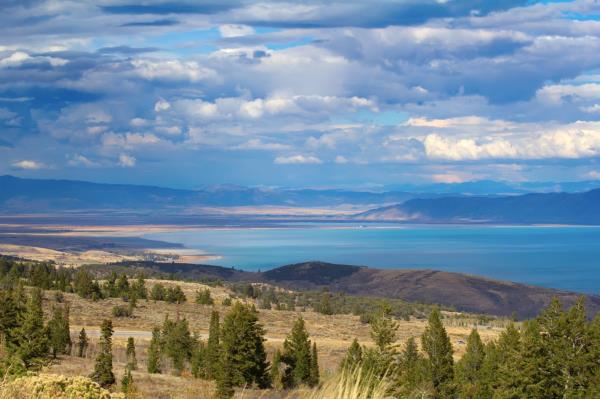Bill would enable Bear River Basin Adjudication
 BOISE – A bill was introduced in the Idaho Legislature Jan. 29 that, if passed, would begin the process of adjudicating water rights in the Bear River Basin.
BOISE – A bill was introduced in the Idaho Legislature Jan. 29 that, if passed, would begin the process of adjudicating water rights in the Bear River Basin.
A water adjudication is an administrative and legal process where a court determines, or decrees, water rights.
“This is basically enabling legislation to begin the adjudication of the Bear River,” the bill’s sponsor, Sen. Mark Harris, a Republican rancher from Soda Springs, told members of the House Resources and Environment Committee.
The committee agreed to print the bill and will hold a public hearing on the proposed legislation Feb. 5.
The adjudication process would catalog and confirm water rights in the Bear River Basin. The river runs through part of Wyoming, Idaho and Utah.
There has not been a water adjudication process in that basin since 1920, Harris said. Since then, he added, a lot of farms and ranches have changed ownership and there is some confusion about what water is decreed to the land.
He told Idaho Farm Bureau Federation the adjudication “will help clear that up and make sure that the water is decreed to where it’s supposed to be decreed.”
The Snake River Basin Adjudication process, which began in 1987 and officially ended in 2014, decreed 158,600 water rights in southern Idaho.
The Northern Idaho Adjudications process, which is determining water rights in North Idaho, is going on now and the Bear River Basin Adjudication process would begin after that wraps up, in about three to five years, Harris said. He said the Bear River adjudication is expected to take 8-10 years.
A Bear River adjudication is not expected to take as long as the SRBA but it will still be a large undertaking, determining thousands of water rights.
Harris said there are plenty of people concerned about a Bear River adjudication and what it will mean for their current water usage but he said the ultimate goal is to ensure people have secure water rights that can’t be challenged after the adjudication process issues final water rights.
“The fact is, the adjudication will help secure those rights,” he said.
With the massive growth occurring in northern Utah, “They are poking around, they want water and they are looking at the Bear River and Bear Lake,” Harris said.
The Bear River is the largest tributary to the Great Salt Lake.
He said environmental groups are also concerned about brine shrimp in the Great Salt Lake – which some contend is too low – and “they are looking at Bear River water to help fill that up.”
“It’s time to do this to protect what we’ve got because some people want to take it,” Harris said.
He said his main concern is securing unchallengeable water rights for the irrigation water that is the lifeblood of farms and ranches in the basin.
“The land is worthless without water and everybody knows that,” Harris said. “If your crops don’t have anything to drink, they don’t grow. That’s the livelihood of a lot of people in the Bear River Basin.”
A Bear River adjudication would affect Bear Lake, Caribou, Franklin and Oneida counties, parts of Power County and possibly parts of Cassia County.
Unlike the Snake River and North Idaho water adjudication processes, a Bear River adjudication would not include any tribal land.
Harris said people have known for some time that a Bear River adjudication is coming and he acknowledged the concern about that.
“There’s going to be some pain involved, I’m sure of it,” he said. “But I know in the overall scheme of things it will be a good thing.”
The plus side of the legislation, he added, “is that we’re going to do it on our own terms; a judge isn’t going to make us do it. We’re doing it on our own terms; that’s the good thing.”
Still can't find what you are looking for? Find by topic:
- County Presidents & Board Information
- County Resource Page
- Delegate Form
- Discount Programs
- Discussion Meet
- Discussion Meet - High School
- Education Programs
- Events
- Excellence Award (YF&R)
- Expense Voucher
- Flickr- Photos
- Gem State Producer
- High School Discussion Meet
- High School Speech Contest
- Hope in Idaho Ag
- House of Delegates Credentials Form
- IFBF Board of Directors
- IFBF Staff
- Insurance
- Issue Advisory
- Legislative Action Program
- Legislative Issues
- Library
- MAC Trailer
- Magazines
- Map My Benefits
- Member Benefits
- Member Discount
- Membership Application
- Mental Health Resources
- Mission Statement
- Moving Agriculture to the Classroom
- Newsletter Sign up
- News Releases
- News Room
- Open Range Law
- Photo Contest
Thank You to Our Partners









